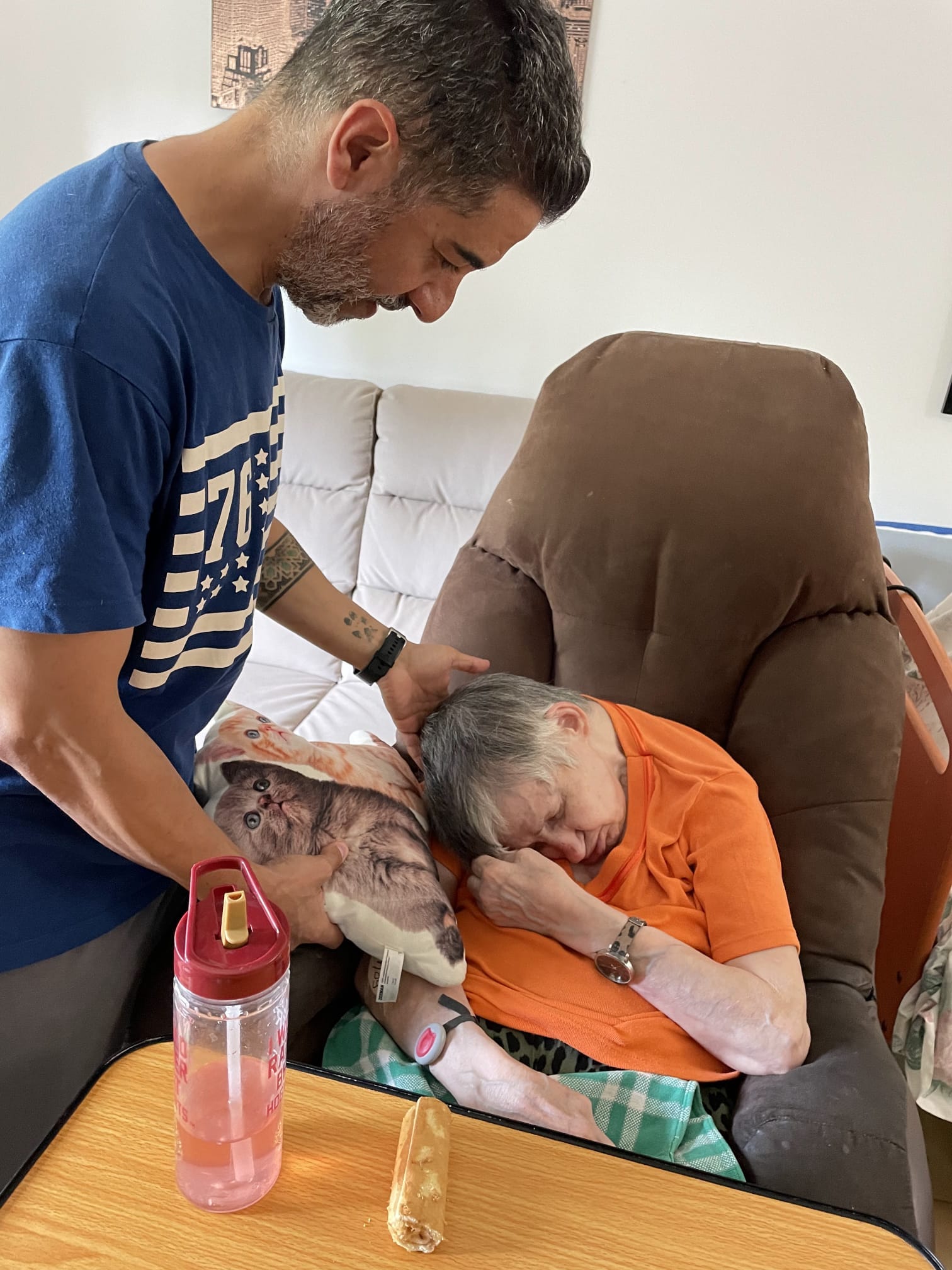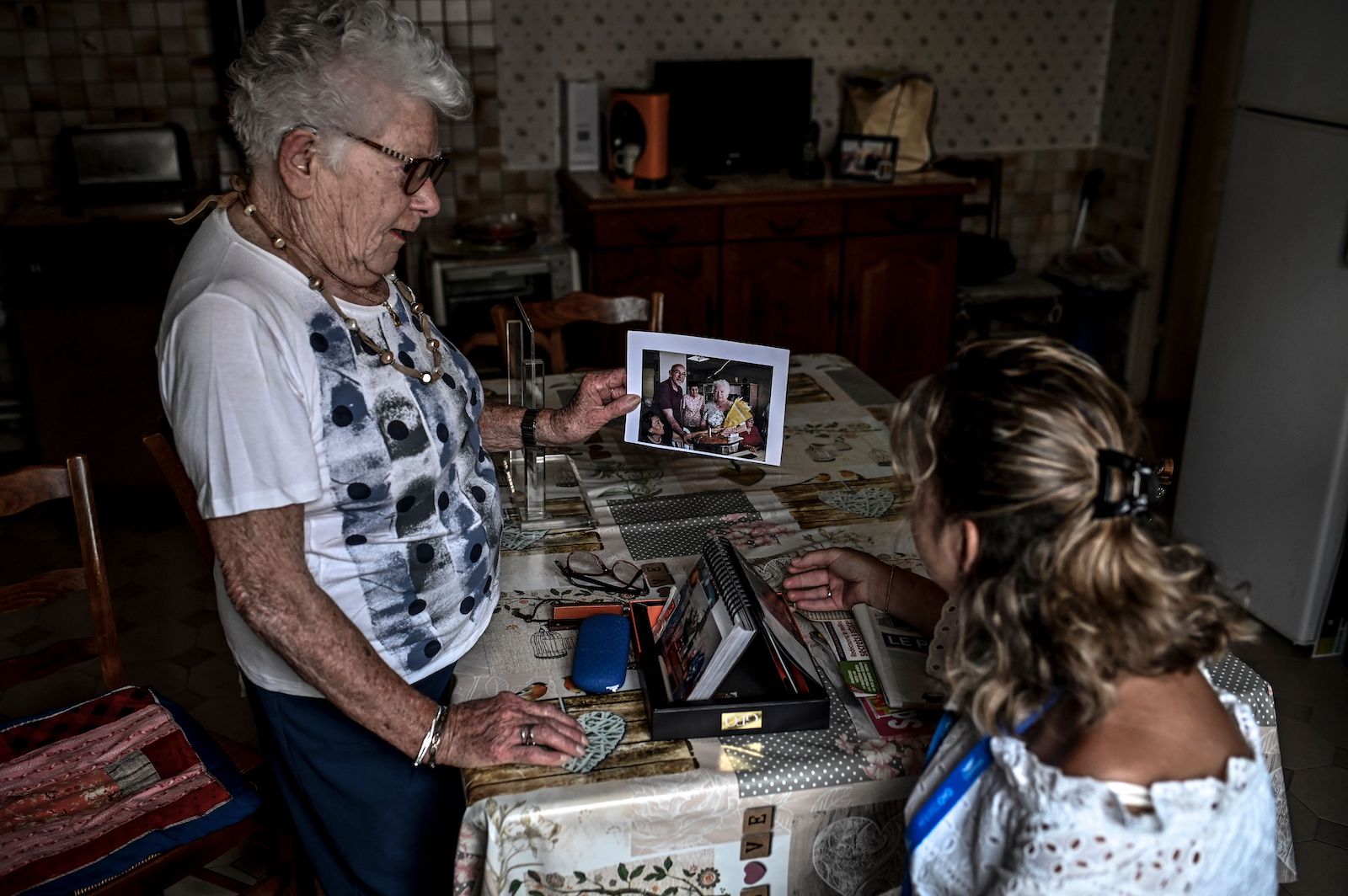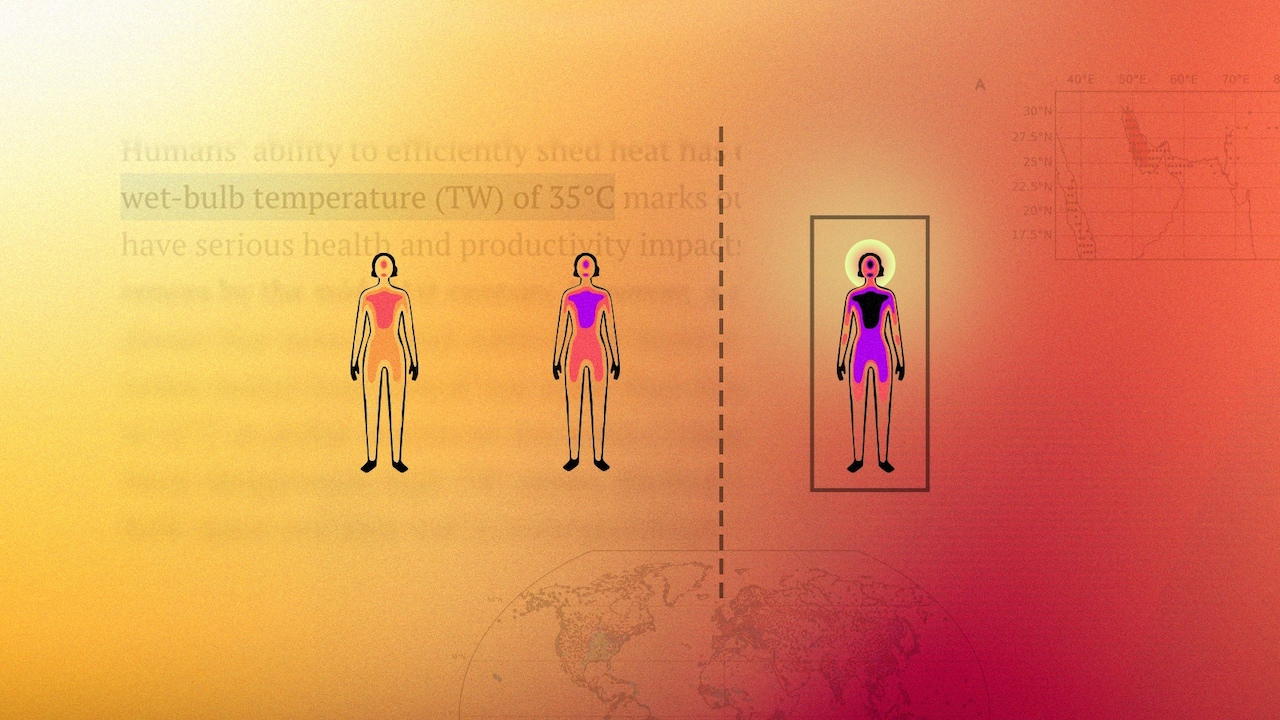For more than three decades, 84-year-old Josette Paoni lived alone in a small, dusty village in the South of France. But this summer, she got a new housemate, Javier Garcia. He’s a Spanish university student interning in France for the summer. He’s half her age and barely speaks French — but he could save her from falling victim to extreme weather events, specifically heat waves like the ones that hit many parts of the world earlier this year.
On a hot day this past July, Garcia poured Paoni a glass of water, adding a dash of grenadine for flavor. “Ella no le gusta el agua sola,” he said. She doesn’t like the taste of water alone.

Javier: Hi, Josette. Ça va? Hi, Josette. How are you?
Josette: Ça va mal, ça va mal. Not well. Not well.
Javier: Está mala. Lleva tres días mala. Tuvo fiebre el lunes y el martes. Ayer no tuvo pero estaba deshidratada. She’s sick. She’s been sick for three days. She had a fever on Monday and Tuesday. Yesterday she didn’t have a fever but she was dehydrated.
Climate change is making heat waves longer, hotter, more frequent, and more dangerous around the globe. Seniors like Paoni are especially vulnerable to heat-related illness because their bodies do not adjust as well as younger people to sudden changes in temperature. As we age, our sweat glands shrink and become less sensitive, which means they produce less body-cooling perspiration. Older people are also more likely to have chronic medical conditions or take prescription medicines that interfere with the body’s normal response to heat.
With fall around the corner, temperatures in Europe are finally starting to drop. But climate studies suggest extreme heat will continue to be a problem for the continent in future years; heat waves in Europe are increasing at a faster rate than almost any other part of the planet. Paoni’s home is located in Provence, where the Mediterranean usually casts a pleasant breeze. But this past summer’s unrelenting heat — the hottest on record — turned the days into a test of her endurance.
As is typical in many parts of Europe, Paoni’s home doesn’t have air conditioning. On hot days, Garcia turns on a small electric fan for air circulation and closes the window blinds to block the sun. He also helps her stay cool by placing wet towels on her arms and legs. He mists her every few minutes with a spray bottle.
Garcia and Paoni found each other through an organization called La Logitude. It’s one of many across France that pairs older people who live alone with younger housemates in exchange for reduced rent. France’s intergenerational housing movement began in response to a devastating heat wave that hit the country in 2003. That summer, around 70,000 people died across Europe. In France, at least 15,000 elderly people died — most of them alone in their homes — as temperatures soared.
The staggering death toll was shocking for the French population, said Manuel Pinto, a director at the organization Petits Frères des Pauvres, or Little Brothers of the Poor, which aims to relieve loneliness and isolation among seniors. After the 2003 heat wave, Little Brothers of the Poor started working with local town halls across France to develop a registry of elderly people who live alone.

JEAN-PHILIPPE KSIAZEK / AFP via Getty Images
When the country’s heat wave alert system goes into effect, volunteers and municipal workers set out to call and visit everyone on their town’s list. In July, as a heat wave lingered for days in the southern city of Marseille, where Pinto is based, calls went out to more than 12,000 seniors and people with disabilities. Still, Pinto says they aren’t reaching everyone.
“Pour nous, c’est la question de la solitude, c’est pas la question de la chaleur,” he said. For us, it’s the question of loneliness, not the question of heat.
An estimated half a million older people in France live without any social connections. Some even report going for months without speaking to another person. While those living alone may be able to look out for themselves under normal circumstances, heat poses a unique challenge. Seniors make up the majority of people at risk during heat waves. But many don’t consider themselves in danger. One French study found that only 4 percent of people 65-and-over consider themselves at high risk during heat waves.
“A natural part of the aging process is that people become less well able to tell that they’re getting into trouble with the heat,” said Kristie Ebi, an epidemiologist at the Center for Health and the Global Environment at the University of Washington. “And that means that you just don’t feel the need to make some changes that need to be made in order to protect oneself.” Those necessary changes, she added, include drinking water, wearing loose clothing, opening doors for air flow, and if it’s really hot, getting to a cooling center.
“Almost all the deaths in a heat wave are preventable,” Ebi said. “But when seniors live on their own, with fewer family and friends around them, they can become isolated. They don’t have that outside reminder that they are at much higher risk when temperatures go up.”
Direct outreach within communities is among the most effective ways to reduce heat deaths in the short-term. It’s a strategy many cities are adopting to cope with high temperatures in Europe and across the U.S. In Philadelphia, volunteer “block captains” check-in on high-risk people. And in New York, a buddy system pairs volunteers with neighbors.
Programs like these have proven effective in reducing heat deaths, but some of the most vulnerable communities may be getting left behind. Research has shown that low-income neighborhoods and communities of color are hit the hardest by extreme heat. People in urban centers are disproportionately likely to live in buildings with poor ventilation made of materials that trap heat. They may also experience pre-existing health conditions that increase risk of heat illness with less access to health care. And a lack of representation in political and economic systems makes it more difficult for these communities to prepare for and respond to climate emergencies.
Outreach programs require strong local networks and, at least in France, Pinto says preparedness varies widely. “Nos dirigeants ne voient pas l’enjeu qu’il y a de cette transition démographique.” Our leaders do not see what is at stake with this demographic transition, he said. Nearly a third of the French population will be over the age of 65 by 2050. Pinto believes that along with long-term planning for climate change, there must be better planning to support an aging population.
Back in Provence, Garcia is there to keep Paoni from falling victim to a heat wave whose full toll France has yet to calculate. Paoni is thankful for his care and his companionship.
“Je demande tous les matins à Javier un bisou.” I ask Javier for a kiss every morning, she said.
Sofie Kodner is a writer with the Investigative Reporting Program at Berkeley Journalism. She reported this story through a grant from The SCAN Foundation. Harry Tarpey assisted with translation and field production.


